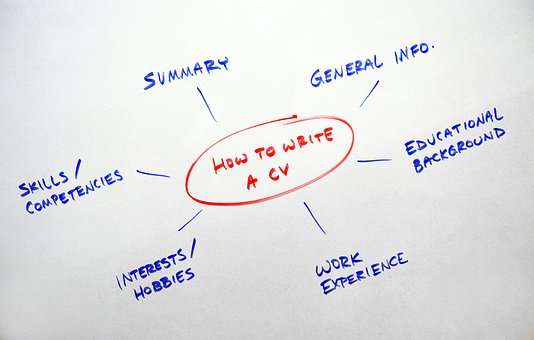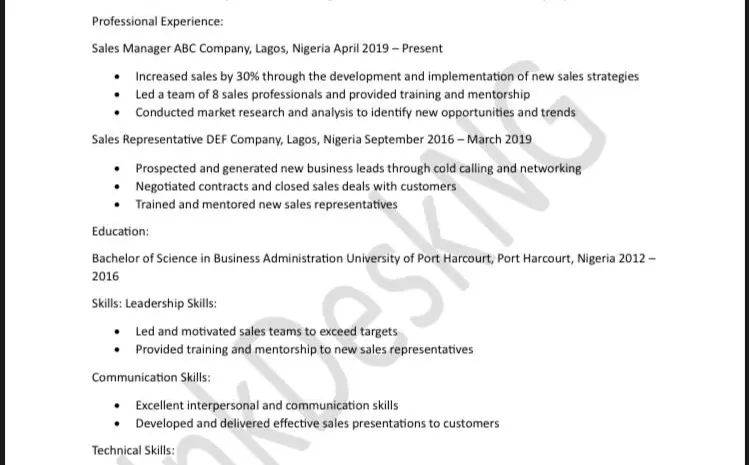A well-crafted resume is the first step towards getting your foot in the door of your dream job. However, with so many job seekers vying for the same positions, it can be challenging to stand out from the crowd without an effective CV.
This is why you need to learn how to write an effective CV. The obvious truth is, a CV serves as the first key to landing you an interview. But that can only be possible when you know how to create it well.
In a bid to help you learn how to create a CV, we decided to write this post, unearthing the 7 secrets of an effective resume.

Here are seven secrets to help you write an effective CV that will make a lasting impression on potential employers:
1. Tailor Your Resume to the Job Description
One of the most important things you can do to make your resume stand out is to tailor it to the job description. Doing this is very important, but many job applicants take it with levity.
It is important to note that there are no one-file-fits-all CV, unless you’re applying to a similar job with the one you craft your old CV for. Almost every job vacancy has some specific skills and requirements expected of a potential employee.
It is only when you have these in your CV that you can stand a chance of getting considered for the next stage of the application process.
Here are simple tips that can help you tailor your CV to a job vacancy:
- Look closely at the job posting and make sure that your resume highlights the skills and experience that the employer is looking for. If it doesn’t, you just have to tailor your CV to the application. If you need help doing this, you can speak with us now.
- Use keywords from the job description in your resume to show that you have the necessary qualifications.
For example, if the job description calls for someone with experience in social media marketing, make sure to highlight any relevant experience you have in this area.
If you have experience with specific social media platforms, such as Facebook, Twitter, or Instagram, mention these in your resume.
By tailoring your resume to the job description, you show the employer that you have read the job posting carefully and that you are a good match for the position.
2. Use a Strong Headline and Summary
Your headline and summary are the first things that potential employers will see on your resume, so it’s essential to make them count. Your headline should be a brief statement that summarizes your skills and experience, while your summary should provide a more detailed overview of your qualifications and achievements.
Make sure that your headline and summary are tailored to the job description and emphasize your most relevant skills and experience. To do this effectively, use strong, active language to describe your achievements and highlight your strengths.
Don’t forget to speak with a professional at inkdesk if you need help doing this as well.
3. Highlight Your Achievements
When it comes to writing a resume, many people focus on their responsibilities rather than their achievements. However, employers are looking for candidates who can make a difference and add value to their organization. Therefore, it’s essential to highlight your achievements and the impact that you have made in your previous roles.
To do this, use bullet points to list your achievements, and make sure to quantify them wherever possible. For example, instead of saying that you increased sales, say that you increased sales by 20% in six months.
Highlighting your achievements is a way of demonstrating to potential employers that you are a results-oriented candidate who can deliver tangible results.
4. Use Strong Action Verbs
Action verbs are an essential element of an effective resume. Strong action verbs do not only convey a sense of energy and enthusiasm, they also help to make your resume stand out.
It is best to use action verbs to describe your achievements and responsibilities. Aside from using action verbs, it is also important to vary your language to keep the reader engaged.
Here are some examples of strong action verbs you can use when writing your resume:
- Achieved
- Completed
- Developed
- Implemented
- Managed
- Produced
- Resolved
- Solved
- Trained
These verbs can create a dynamic and engaging resume that showcases your skills and experience. Make sure to also check out our post on how to use power words effectively when writing a CV.
5. Use a Professional Format
Your resume is a representation of yourself, so it’s essential to use a professional format. To do this, note the following:
- Use a clean, easy-to-read font like Arial or Times New Roman, and make sure that your resume is well-organized and easy to navigate.
- You’ll need bullet points to list your achievements and responsibilities.
- Make sure that your resume is no more than two pages long.
- Use a consistent format throughout your resume, and make sure that your contact information is easy to find.
Obviously, these are easy things you can do unless you’re not familiar with word processing application. Anyway, you can always contact us at inkdesk if you need a help with formatting your resume professionally.
6. Emphasize Your Transferable Skills
Transferable skills are skills that can be applied across different industries and job roles. For example, communication, problem-solving, and time management are all transferable skills that are highly valued by employers.
How do we mean?
Before applying for that desired job, you must have engaged in different tasks, most especially in your previous work, right? So, transferable skills are those skills you regularly use in your previous role, which can be applicable or relevant in the next role you’re applying for.
Did you get the idea now?
When writing your resume, make sure to highlight your transferable skills, especially if you’re applying for a job in a different industry or field. Think about how your previous experience has equipped you with skills that could be useful in your new role.
For example, if you’re applying for a marketing position but you have a background in teaching, you might highlight your communication and presentation skills, as well as your ability to develop and implement lesson plans.
In so doing this, you can demonstrate to potential employers that you have the skills and experience necessary to excel in your new role.
7. Proofread Your Resume
As simple as it may sound, this is the aspect where most applicants fail. Don’t be amongst those who don’t care to proofread their resume before sending it to a potential employer.
Even the best resumes can be undermined by spelling and grammatical errors. Therefore, it’s essential to proofread your CV carefully before submitting it.
A good idea is to use a spell-check tool to catch any obvious errors. Mind you, don’t rely entirely on a proofreading tool.
That said, always read through your resume several times to ensure that it is error-free and that there are no inconsistencies or typos. You can also consider asking a friend or family member to read it also, as they may be able to catch the errors that you missed.
The Bottom Line
Writing an effective resume is a crucial step towards landing your dream job. You can definitely do this on your own, and you can also hire the service of a professional.
In case you’re writing your CV yourself, make sure you consider the tips highlighted here. By following these secrets, you can increase your chances of getting noticed by potential employers and securing an interview.

